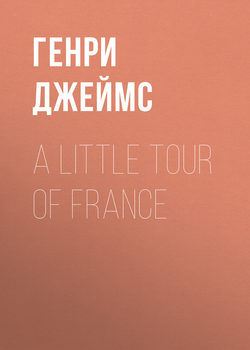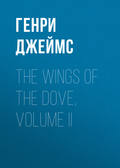Preface
The notes presented in this volume were gathered, as will easily be perceived, a number of years ago and on an expectation not at that time answered by the event, and were then published in the United States. The expectation had been that they should accompany a series of drawings, and they themselves were altogether governed by the pictorial spirit. They made, and they make in appearing now, after a considerable interval and for the first time, in England, no pretension to any other; they are impressions, immediate, easy, and consciously limited; if the written word may ever play the part of brush or pencil, they are sketches on "drawing-paper" and nothing more. From the moment the principle of selection and expression, with a tourist, is not the delight of the eyes and the play of fancy, it should be an energy in every way much larger; there is no happy mean, in other words, I hold, between the sense and the quest of the picture, and the surrender to it, and the sense and the quest of the constitution, the inner springs of the subject—springs and connections social, economic, historic.
One must really choose, in other words, between the benefits of the perception of surface—a perception, when fine, perhaps none of the most frequent—and those of the perception of very complex underlying matters. If these latter had had, for me, to be taken into account, my pages would not have been collected. At the time of their original appearance the series of illustrations to which it had been their policy to cling for countenance and company failed them, after all, at the last moment, through a circumstance not now on record; and they had suddenly to begin to live their little life without assistance. That they have seemed able in any degree still to prolong even so modest a career might perhaps have served as a reason for leaving them undisturbed. In fact, however, I have too much appreciated—for any renewal of inconsistency—the opportunity of granting them at last, in an association with Mr. Pennell's admirable drawings, the benefit they have always lacked. The little book thus goes forth finally as the picture-book it was designed to be. Text and illustrations are, altogether and alike, things of the play of eye and hand and fancy—views, head-pieces, tail-pieces; through the artist's work, doubtless, in a much higher degree than the author's.
But these are words enough on a minor point. Many things come back to me on reading my pages over—such a world of reflection and emotion as I can neither leave unmentioned nor yet, in this place, weigh them down with the full expression of. Difficult indeed would be any full expression for one who, deeply devoted always to the revelations of France, finds himself, late in life, making of the sentiment no more substantial, no more direct record than this mere revival of an accident. Not one of these small chapters but suggests to me a regret that I might not, first or last, have gone farther, penetrated deeper, spoken oftener—closed, in short, more intimately with the great general subject; and I mean, of course, not in such a form as the present, but in many another, possible and impossible. It all comes back, doubtless, this vision of missed occasions and delays overdone, to the general truth that the observer, the enjoyer, may, before he knows it, be practically too far in for all that free testimony and pleasant, easy talk that are incidental to the earlier or more detached stages of a relation. There are relations that soon get beyond all merely showy appearances of value for us. Their value becomes thus private and practical, and is represented by the process—the quieter, mostly, the better—of absorption and assimilation of what the relation has done for us. For persons thus indebted to the genius of France—however, in its innumerable ways, manifested—the profit to be gained, the lesson to be learnt, is almost of itself occupation enough. They feel that they bear witness by the intelligent use and application of their advantage, and the consciousness of the artist is therefore readily a consciousness of pious service. He may repeatedly have dreamt of some such happy combination of mood and moment as shall launch him in a profession of faith, a demonstration of the interesting business; he may have had inner glimpses of an explicit statement, and vaguely have sketched it to himself as one of the most candid and charming ever drawn up; but time, meanwhile, has passed, interruptions have done their dismal work, the indirect tribute, too, has perhaps, behind the altar, grown and grown; and the reflection has at all events established itself that honour is more rendered by seeing and doing one's work in the light than by brandishing the torch on the house-tops. Curiosity and admiration have operated continually, but with as little waste as they could. The drawback is only that in this case, to be handsomely consequent, one would perhaps rather not have appeared to celebrate any rites. The moral of all of which is that those here embodied must pass, at the best, but for what they are worth.
H. J.
August 9, 1900.
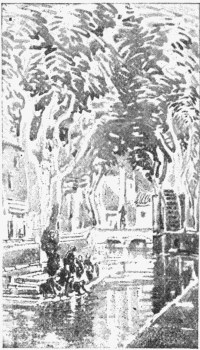

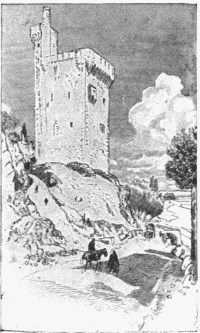
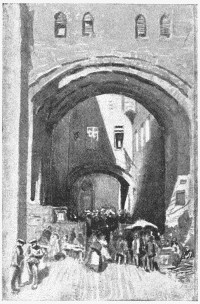
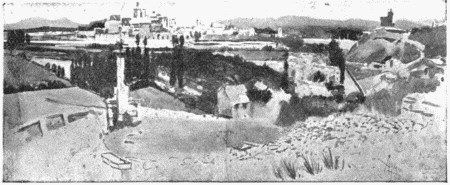
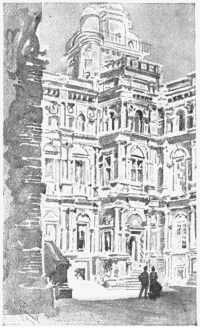

Introductory
Though the good city of Paris appears to be less in fashion than in other days with those representatives of our race—not always, perhaps, acknowledged as the soundest and stiffest—curious of foreign opportunity and addicted to foreign sojourns, it probably none the less remains true that such frequentations of France as may be said still to flourish among us have as much as ever the wondrous capital, and the wondrous capital alone, for their object. The taste for Paris, at all events, is—or perhaps I should say was, alluding as I do, I fear, to a vanished order—a taste by itself; singularly little bound up, of necessity, with such an interest in the country at large as would be implied by an equal devotion, in other countries, to other capitals. Putting aside the economic inducement, which may always operate, and limiting the matter to the question of free choice, it is sufficiently striking that the free chooser would have to be very fond of England to quarter himself in London, very fond of Germany to quarter himself in Berlin, very fond of America to quarter himself in New York. It had, on the other hand, been a common reflection for the author of these light pages that the fondness for France (throughout the company of strangers more or less qualified) was oddly apt to feed only on such grounds for it as made shift to spread their surface between the Arc de Triomphe and the Gymnase Theatre: as if there were no good things in the doux pays that could not be harvested in that field. It matters little how the assumption began to strike him as stupid, especially since he himself had doubtless equally shared in the guilt of it. The light pages in question are but the simple record of a small personal effort to shake it off. He took, it must be confessed, no extraordinary measures; he merely started, one rainy morning in mid-September, for the charming little city of Tours, where he felt that he might as immediately as anywhere else see it demonstrated that, though France might be Paris, Paris was by no means France. The beauty of the demonstration—quite as prompt as he could have desired—drew him considerably farther, and his modest but eminently successful adventure begot, as aids to amused remembrance, a few informal notes.
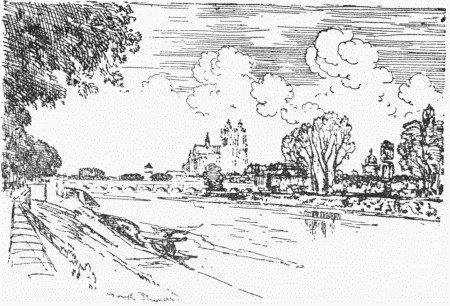
Chapter i
Tours
I AM ashamed to begin with saying that Touraine is the garden of France; that remark has long ago lost its bloom. The town of Tours, however, has something sweet and bright, which suggests that it is surrounded by a land of fruits. It is a very agreeable little city; few towns of its size are more ripe, more complete, or, I should suppose, in better humour with themselves and less disposed to envy the responsibilities of bigger places. It is truly the capital of its smiling province; a region of easy abundance, of good living, of genial, comfortable, optimistic, rather indolent opinions. Balzac says in one of his tales that the real Tourangeau will not make an effort, or displace himself even, to go in search of a pleasure; and it is not difficult to understand the sources of this amiable cynicism. He must have a vague conviction that he can only lose by almost any change. Fortune has been kind to him: he lives in a temperate, reasonable, sociable climate, on the banks of a river which, it is true, sometimes floods the country around it, but of which the ravages appear to be so easily repaired that its aggressions may perhaps be regarded (in a region where so many good things are certain) merely as an occasion for healthy suspense. He is surrounded by fine old traditions, religious, social, architectural, culinary; and he may have the satisfaction of feeling that he is French to the core. No part of his admirable country is more characteristically national. Normandy is Normandy, Burgundy is Burgundy, Provence is Provence; but Touraine is essentially France. It is the land of Rabelais, of Descartes, of Balzac, of good books and good company, as well as good dinners and good houses. George Sand has somewhere a charming passage about the mildness, the convenient quality, of the physical conditions of central France—"son climat souple et chaud, ses pluies abondantes et courtes." In the autumn of 1882 the rains perhaps were less short than abundant; but when the days were fine it was impossible that anything in the way of weather could be more charming. The vineyards and orchards looked rich in the fresh, gay light; cultivation was everywhere, but everywhere it seemed to be easy. There was no visible poverty; thrift and success presented themselves as matters of good taste. The white caps of the women glittered in the sunshine, and their well-made sabots clicked cheerfully on the hard, clean roads. Touraine is a land of old châteaux,—a gallery of architectural specimens and of large hereditary properties. The peasantry have less of the luxury of ownership than in most other parts of France; though they have enough of it to give them quite their share of that shrewdly conservative look which, in the little chaffering place of the market-town, the stranger observes so often in the wrinkled brown masks that surmount the agricultural blouse. This is, moreover, the heart of the old French monarchy; and as that monarchy was splendid and picturesque, a reflection of the splendour still glitters in the current of the Loire. Some of the most striking events of French history have occurred on the banks of that river, and the soil it waters bloomed for a while with the flowering of the Renaissance. The Loire gives a great "style" to a landscape of which the features are not, as the phrase is, prominent, and carries the eye to distances even more poetic than the green horizons of Touraine. It is a very fitful stream, and is sometimes observed to run thin and expose all the crudities of its channel—a great defect certainly in a river which is so much depended upon to give an air to the places it waters. But I speak of it as I saw it last; full, tranquil, powerful, bending in large slow curves and sending back half the light of the sky. Nothing can be finer than the view of its course which you get from the battlements and terraces of Amboise. As I looked down on it from that elevation one lovely Sunday morning, through a mild glitter of autumn sunshine, it seemed the very model of a generous, beneficent stream. The most charming part of Tours is naturally the shaded quay that overlooks it, and looks across too at the friendly faubourg of Saint Symphorien and at the terraced heights which rise above this. Indeed, throughout Touraine it is half the charm of the Loire that you can travel beside it. The great dyke which protects it, or protects the country from it, from Blois to Angers, is an admirable road; and on the other side as well the highway constantly keeps it company. A wide river, as Tours you follow a wide road, is excellent company; it brightens and shortens the way.
The inns at Tours are in another quarter, and one of them, which is midway between the town and the station, is very good. It is worth mentioning for the fact that every one belonging to it is extraordinarily polite—so unnaturally polite as at first to excite your suspicion that the hotel has some hidden vice, so that the waiters and chambermaids are trying to pacify you in advance. There was one waiter in especial who was the most accomplished social being I have ever encountered; from morning till night he kept up an inarticulate murmur of urbanity, like the hum of a spinning-top. I may add that I discovered no dark secrets at the Hôtel de l'Univers; for it is not a secret to any traveller to-day that the obligation to partake of a lukewarm dinner in an overheated room is as imperative as it is detestable. For the rest, at Tours there is a certain Rue Royale which has pretensions to the monumental; it was constructed a hundred years ago, and the houses, all alike, have on a moderate scale a pompous eighteenth-century look. It connects the Palais de Justice, the most important secular building in the town, with the long bridge which spans the Loire—the spacious, solid bridge pronounced by Balzac, in "Le Curé de Tours," "one of the finest monuments of French architecture." The Palais de Justice was the seat of the Government of Léon Gambetta in the autumn of 1870, after the dictator had been obliged to retire in his balloon from Paris and before the Assembly was constituted at Bordeaux. The Germans occupied Tours during that terrible winter: it is astonishing, the number of places the Germans occupied. It is hardly too much to say that, wherever one goes in certain parts of France, one encounters two great historic facts: one is the Revolution; the other is the German invasion. The traces of the Revolution remain in a hundred scars and bruises and mutilations, but the visible marks of the war of 1870 have passed away. The country is so rich, so living, that she has been able to dress her wounds, to hold up her head, to smile again, so that the shadow of that darkness has ceased to rest upon her. But what you do not see you still may hear; and one remembers with a certain shudder that only a few short years ago this province, so intimately French, was under the heel of a foreign foe. To be intimately French was apparently not a safeguard; for so successful an invader it could only be a challenge. Peace and plenty, however, have succeeded that episode; and among the gardens and vineyards of Touraine it seems only a legend the more in a country of legends.
It was not, all the same, for the sake of this chequered story that I mentioned the Palais de Justice and the Rue Royale. The most interesting fact, to my mind, about the high-street of Tours was that as you walk toward the bridge on the right hand trottoir you can look up at the house, on the other side of the way, in which Honoré de Balzac first saw the light. That violent and complicated genius was a child of the good-humoured and succulent Touraine. There is something anomalous in this fact, though, if one thinks about it a little, one may discover certain correspondences between his character and that of his native province. Strenuous, laborious, constantly infelicitous in spite of his great successes, he suggests at times a very different set of influences. But he had his jovial, full-feeding side—the side that comes out in the "Contes Drolatiques," which are the romantic and epicurean chronicle of the old manors and abbeys of this region. And he was, moreover, the product of a soil into which a great deal of history had been trodden. Balzac was genuinely as well as affectedly monarchical, and he was saturated with a sense of the past. Number 39 Rue Royale—of which the basement, like all the basements in the Rue Royale, is occupied by a shop—is not shown to the public; and I know not whether tradition designates the chamber in which the author of "Le Lys dans la Vallée" opened his eyes into a world in which he was to see and to imagine such extraordinary things. If this were the case I would willingly have crossed its threshold; not for the sake of any relic of the great novelist which it may possibly contain, nor even for that of any mystic virtue which may be supposed to reside within its walls, but simply because to look at those four modest walls can hardly fail to give one a strong impression of the force of human endeavour. Balzac, in the maturity of his vision, took in more of human life than any one, since Shakspeare, who has attempted to tell us stories about it; and the very small scene on which his consciousness dawned is one end of the immense scale that he traversed. I confess it shocked me a little to find that he was born in a house "in a row"—a house, moreover, which at the date of his birth must have been only about twenty years old. All that is contradictory. If the tenement selected for this honour could not be ancient and embrowned, it should at least have been detached.

TOURS—THE HOUSE OF BALZAC
There is a charming description in his little tale of "La Grenadière" of the view of the opposite side of the Loire as you have it from the square at the end of the Rue Royale—a square that has some pretensions to grandeur, overlooked as it is by the Hôtel de Ville and the Musée, a pair of edifices which directly contemplate the river, and ornamented with marble images of François Rabelais and René Descartes. The former, erected a few years since, is a very honourable production; the pedestal of the latter could, as a matter of course, only be inscribed with the Cogito ergo Sum. The two statues mark the two opposite poles to which the wondrous French mind has travelled; and if there were an effigy of Balzac at Tours it ought to stand midway between them. Not that he by any means always struck the happy mean between the sensible and the metaphysical; but one may say of him that half of his genius looks in one direction and half in the other. The side that turns toward François Rabelais would be, on the whole, the side that takes the sun. But there is no statue of Balzac at Tours; there is only in one of the chambers of the melancholy museum a rather clever, coarse bust. The description in "La Grenadière" of which I just spoke is too long to quote; neither have I space for anyone of the brilliant attempts at landscape-painting which are woven into the shimmering texture of "Le Lys dans la Vallée." The little manor of Clochegourde, the residence of Madame de Mortsauf, the heroine of that extraordinary work, was within a moderate walk of Tours, and the picture in the novel is presumably a copy from an original which it would be possible to-day to discover. I did not, however, even make the attempt. There are so many châteaux in Touraine commemorated in history that it would take one too far to look up those which have been commemorated in fiction. The most I did was to endeavour to identify the former residence of Mademoiselle Gamard, the sinister old maid of "Le Curé de Tours." This terrible woman occupied a small house in the rear of the cathedral, where I spent a whole morning in wondering rather stupidly which house it could be. To reach the cathedral from the little place where we stopped just now to look across at the Grenadière, without, it must be confessed, very vividly seeing it, you follow the quay to the right and pass out of sight of the charming côteau which, from beyond the river, faces the town—a soft agglomeration of gardens, vineyards, scattered villas, gables and turrets of slate-roofed châteaux, terraces with grey balustrades, moss-grown walls draped in scarlet Virginia-creeper. You turn into the town again beside a great military barrack which is ornamented with a rugged mediæval tower, a relic of the ancient fortifications, known to the Tourangeaux of to-day as the Tour de Guise. The young Prince of Joinville, son of that Duke of Guise who was murdered by the order of Henry II. at Blois, was, after the death of his father, confined here for more than two years, but made his escape one summer evening in 1591, under the nose of his keepers, with a gallant audacity which has attached the memory of the exploit to his sullen-looking prison. Tours has a garrison of five regiments, and the little red-legged soldiers light up the town. You see them stroll upon the clean, uncommercial quay, where there are no signs of navigation, not even by oar, no barrels nor bales, no loading nor unloading, no masts against the sky nor booming of steam in the air. The most active business that goes on there is that patient and fruitless angling in which the French, as the votaries of art for art, excel all other people. The little soldiers, weighed down by the contents of their enormous pockets, pass with respect from one of these masters of the rod to the other, as he sits soaking an indefinite bait in the large, indifferent stream. After you turn your back to the quay you have only to go a little way before you reach the cathedral.



